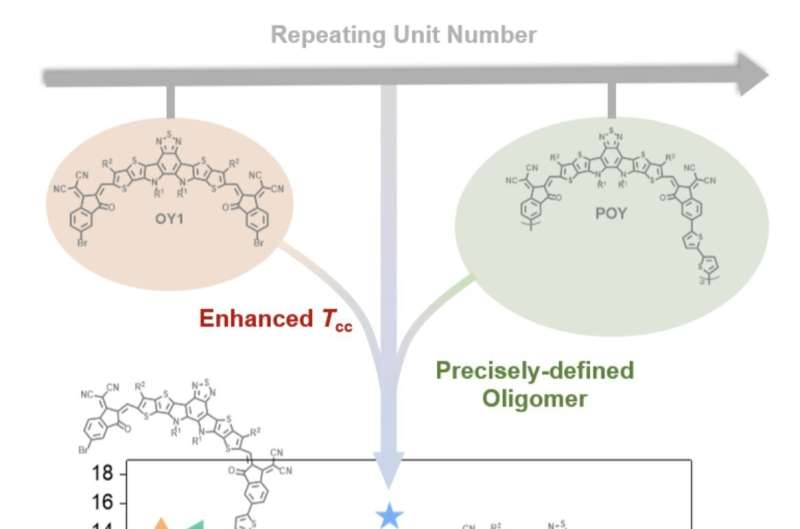Stable and efficient organic solar cells based on oligomer acceptors
November 28, 2022
feature

Organic solar cells are photovoltaic technologies with light-absorbing layers made of conductive organic polymers or organic molecules. These solar energy solutions can have notable advantages over their non-organic counterparts, including lighter weight, a larger area coverage and lower fabrication costs.
Some organic solar cells created over the past few years achieved promising power conversion efficiencies of over 19%. Nonetheless, creating organic cells that are efficient but also stable in their long-term operation has proved to be highly challenging.
Researchers at South China University of Technology and Friedrich-Alexander-Universität Erlangen-Nürnberg have recently developed new organic solar cells with a good power conversion efficiency and improved stability. These cells, introduced in a paper in Nature Energy, are characterized by an altered molecular chain length, achieved using a series of oligomer acceptors (i.e., molecules composed of many linked atoms that can bind to electrons).
“Many works have shown that Y-series polymer acceptors can sustain the outstanding photovoltaic performance of their precursor small molecular acceptors (SMAs), and all-polymer solar cells have great advantages in morphology stability compared with SMAs, which shows great potential for their practical applications,” Ning Li, one of the researchers who carried out the study, told TechXplore. “However, these kinds of Y-series polymer acceptors have uncertain molecular weight and are trapped by batch-to-batch differences.”
To overcome the limitations of previously reported Y-series polymer acceptors, Li and his colleagues prepared an alternative series of acceptors based on oligomers, a class of polymers with molecules consisting of relatively few repeating units of atoms or groups of atoms. Subsequently, they conducted experiments testing their effectiveness, while also investigating the molecular weight-function relationship and property transition from SMAs to polymer acceptors.
In these experiments, an organic solar cell based on an oligomer acceptor prepared by the researchers achieved power conversion efficiencies above 15% and an extrapolated T80 lifetime over 25,000 h. These values confirm the promise of the team’s strategy for creating organic cells that are both stable and efficient.
“The oligomer acceptor we developed not only inherits the appropriate crystallinity from SMA, but also presents comparable thermal stability to polymer acceptors, contributing to the development of solar cells that combine a high efficiency with a long lifetime,” Li explained. “Overall, the oligomeric strategy we proposed could help to solve the conundrum of constructing stable and efficient OSCs and provides innovative insight into molecular design.”
In the future, the new organic solar cell design introduced by this team of researchers could pave the way toward the development of organic solar cell technologies that can be effectively implemented on a large-scale. Li and his colleagues will now continue working on their design to achieve greater efficiencies and stabilities.
“We are now planning to further optimize the molecular design of oligomer acceptors, so we can improve the efficiency and stability of OSCs simultaneously,” Li added. “We would also like to reduce the cost of preparing oligomer acceptors to meet the commands for commercial production.”
Youcai Liang et al, Organic solar cells using oligomer acceptors for improved stability and efficiency, Nature Energy (2022). DOI: 10.1038/s41560-022-01155-x
© 2022 Science X Network
Citation:
Stable and efficient organic solar cells based on oligomer acceptors (2022, November 28)
retrieved 28 November 2022
from https://techxplore.com/news/2022-11-stable-efficient-solar-cells-based.html
This document is subject to copyright. Apart from any fair dealing for the purpose of private study or research, no
part may be reproduced without the written permission. The content is provided for information purposes only.
For all the latest Technology News Click Here
For the latest news and updates, follow us on Google News.

